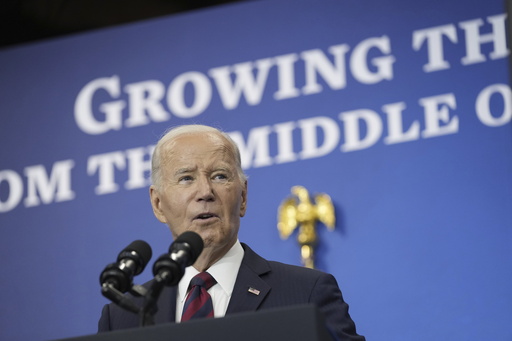
WASHINGTON — House Republicans are preparing to hold a vote this week on a bipartisan proposal aimed at progressively adding 66 federal judgeships nationwide. However, Democrats are now reconsidering their support in light of President-elect Donald Trump’s recent victory in the election.
The White House announced on Tuesday that if President Joe Biden were to receive the legislation, he would likely reject it. Given the closely divided Congress, which is heavily polarized along party lines, it would be a challenge to override any veto, thereby putting the bill’s prospects for this year in jeopardy.
This shift marks a significant turnaround for a bill that received unanimous approval in the Senate back in August. The Republican-controlled House delayed taking action on the measure until after the election, which outlines a timeline of about a decade for introducing the new judgeships, allowing three presidential terms to participate in the appointments.
Rep. Jerry Nadler, a Democrat from New York, noted that the legislation was negotiated with the expectation that three future, unpredictable presidents would contribute to expanding and influencing the judicial landscape. He emphasized that no political party would be intentionally granted an advantage. Nadler expressed his frustrations with GOP leadership for not advancing the measure prior to the election.
“It was a fair fight, and they opted out of it,” Nadler remarked.
House Judiciary Committee Chairman Rep. Jim Jordan, a Republican, attributed the delayed consideration to their busy agenda, stating, “We just didn’t get to the legislation.”
The apparent reevaluation from some Democrats concerning the bill and the newfound drive from House Republicans to discuss the issue reveal the contentious nature surrounding federal judicial openings. In the present political climate, Senate roll-call votes have become the norm for nearly all judicial nominations, with most decisions for Supreme Court and appellate judges being strictly along party lines. Lawmakers are reluctant to allow presidents from the opposing party new avenues to reshape the courts.
Nadler pointed out that the proposed bill would enable Trump to make 25 judicial appointments in addition to over 100 vacancies anticipated in the coming four years. “Donald Trump has made clear his intention to enhance presidential authority, and providing him with 25 new judicial appointees further equips him in that pursuit,” said Nadler.
Although Nadler expressed openness to pursuing similar legislation in the future that might allow “unknown future presidents” to make additional appointments, he is currently urging his colleagues to vote against this particular bill.
Nevertheless, there is little opposition regarding the need for additional judges. It has been over 20 years since Congress last authorized new district judgeships, and with the rising number of filed cases, litigants are often left waiting years for resolutions.
“It’s desperately needed,” said House Speaker Mike Johnson, a Republican from Louisiana, reflecting on the bill’s significance.
Sen. Todd Young, a Republican from Indiana, first introduced this legislation to expand the number of judgeships back in 2020. In the previous year, the Judicial Conference of the United States, which sets policy for the federal court system, recommended increasing the number of district and court of appeals judgeships due to escalating workload demands.
According to Judge Timothy Corrigan of the Middle District of Florida, judges are working diligently to manage growing case demands and resolve disputes swiftly, yet the overwhelmed caseloads and insufficient judicial resources complicate this mission. In a recent blog post, he highlighted the delays in handling cases which may undermine public trust in the judicial system, stating that the proposed bill could address many pressing needs within the federal judiciary.
As of June 30, Jordan reported nearly 750,000 pending cases in federal district courts across the nation, with each judge managing an average of 554 filings. When questioned if House Republicans would have brought this bill forward had Vice President Kamala Harris won the election, Jordan maintained that the legislation is “the right thing to do,” noting that nearly half of the first set of judges would be sourced from states with Democratic senators, allowing those states to have input on the nominations.
However, in the veto threat issued by the White House Office of Management and Budget, it was stated that the bill proposes new judgeships in states where senators are attempting to keep existing judicial vacancies open. “These efforts to maintain vacancies indicate that concerns about judicial efficiency and caseloads may not be the genuine impetus behind the bill’s passage,” the White House asserted.
Just prior to the veto threat announcement, Senate Republican leader Mitch McConnell expressed curiosity about Biden’s reasoning for potential rejection of the measure, labeling it as “inconceivable” for a lame-duck president to consider vetoing such a sensible step without ulterior motives. “There seems to be no explanation other than personal spite,” McConnell stated.
